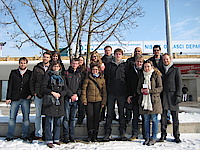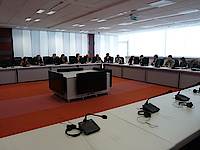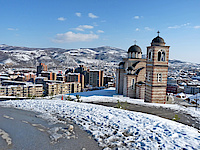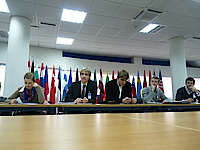Field Trip to Kosovo 2011
As Part of the Masters Seminar “The Kosovo Protectorate: Military and Civil Dimensions of Strategic Capacity”
by Claudia Katzl, Anne Lange und Steffen Eckhard
This research seminar was actively engaged in studying the difficulties faced by international actors working in Kosovo since the 1999 intervention, especially the problem of developing appropriate civil and military strategies as well as examining the successes and failures of policy thus far. At the same time, the objective of the seminar was to gain some insight into the complex problems of modern peacekeeping operations, in addition to examining the construct of “strategic capacity” empirically, on the basis of existing literature and interviews conducted locally. That the research seminar was able to take place is thanks to the generous financial support of the department, the Center of Excellence, the UGK, and the VEUK. The seminar meetings were further enriched by the expertise of Peter Schumann, a former UN staff member in Kosovo and now a senior fellow in the Center of Excellence.
The first part of the seminar’s meetings (scheduled in part as a block) was devoted to working out theoretical and empirical principles with respect to the causes and course of the conflict, as well as investigating relevant civil and military aspects of international administration. The pedagogical approach was directed toward group work so that students might better grasp the abstract concept of “strategic capacity”. Among the topics explored by the students in groups were the meanings of “strategy” and “strategic capacity”, the temporal and subject dimensions of these notions, and the importance of “strategic capacity” for working within a modern protectorate. Options for implementing the strategies were formulated, gaps were identified in the research literature, and initial assessments were conducted of the political players and policy areas involved.
Equipped with this extensive (but also abstract) prior knowledge, the group travelled to Kosovo in January 2011 for one week. The journal in general and the interviews in particular—all of them conducted with experts and led by students—were designed so that the group might understand the Kosovo protectorate in its full complexity. Those who were interviewed included: high-ranking representatives of the UN mission in Kosovo (UNMIK), the most important EU mission (EULEX), the International Civilian Office (ICO), the NATO forces stationed there (KFOR) and the OSCE, as well as the German Embassy and the German Development Cooperation (GIZ and KfW). Yet Kosovarian perspectives on the activities of these international organizations were also heard by the group, specifically in discussions with the head of Kosovo's leading think tank (KIPRED), the Permanent Secretary of the new Kosovo Ministry of Foreign Affairs, and with the Deputy Police President.
Most of the discussions took place in Priština, but the group also travelled to Mitrovica and Peja/Deçani in order to learn something about the more rural world outside the capital city. While Priština gave the impression of being a rather grey, predominantly Muslim, and largely peaceful city—one which is clearly interested having ties to Europe—interethnic conflict in the north of the country, particularly near the centuries-old Serbian Orthodox monasteries, is still very evident at present. It was there that the seminar witnessed some rather surreal scenes. In one of them, motorists on the bridge over the Ibar River (guarded by military and police) switched out their Kosovo license plates for Serbian ones—or vice-versa—because they feared repression on the opposite side of the border. And inasmuch as the city of Mitrovica is divided into Serbian and Kosovo-Albanian quarters, it highlighted the persistence of tensions and the limited range of Kosovo’s governmental authority. One problem that the group encountered repeatedly in discussions was the de facto Serbian administration of northern Mitrovica and northern Kosovo. The fact that this territorial conflict still has not been resolved continues to strain relations between Priština and Belgrade, ultimately endangering the future of both countries. In the process, the population of northern Kosovo is being collectively held hostage while suffering under devastating socioeconomic conditions (including rampant crime) and not having the protection of legal state institutions.
Although the UN Security Council unanimously decided to establish an interim administration for Kosovo, it is particularly tragic that the international community has not been able to take a unified position on the independence of the country. Not even the European Union is unanimous on this issue. As a result, Kosovo has been refused recognition by those countries which themselves have problems with separatist movements. The consequences are not only serious in the north of the country. For there are also judges participating in the development of Kosovo's judicial system within the framework of a European mission (EULEX). Yet they are presently unable to dispense justice on the basis of laws passed by the democratically-elected parliament after the nation first became independent. The students in the seminar identified the inability of the international community to speak with one voice as one of the key obstacles to undertaking strategic and coordinated action. Yet even that is not a guarantee against unwanted side-effects. It thus becomes clear that the objectives of security (and/or stability) and the rule of law are in tension with one another. The weakness of Kosovo's judicial system is also a consequence of the long-term primary focus of international players on a policy of stability.
In the wake of the field trip, participants are now at work processing their impressions and information in written form, as term papers. In the process, the question of the strategic capacity of international actors is being addressed using individual, selected aspects. The students’ written research will then conclude this dramatic simulation of science at work. The project has proceeded from identifying gaps in the research, to elaborating an analytical method, all the way to interviewing experts and analyzing the empirical data collected. In the end, this seminar will give a particularly valuable head start to those students about to commence their master’s theses or doctoral studies.
News
-

Zimbabwe: What if not a coup?
Was President Robert Mugabe’s forced retirement really a coup d’état in disguise? And what policies will his successor, Emmerson Mnangagwa, now offer the country? A conversation with the political scientist and expert on Africa, Martin Welz
-

15. March 2017
Wolfgang Seibel to be member of the scientific advisory board of the journal “Guerres mondiales et conflits contemporains”
Prof. Wolfgang Seibel has been named a member of the scientific advisory board of the French journal “Guerres mondiales et conflits contemporains.”
Wolfgang Seibel is professor of Political and Administrative Science, University of Konstanz. He is member of the executive board and the plenary... -

6. March 2017
New release: The Management of UN Peacekeeping. Edited by Julian Junk, Francesco Mancini, Till Blume, and Wolfgang Seibel
Coordination, Learning, and Leadership in Peace Operations
Boulder: Lynne Rienner 2017



